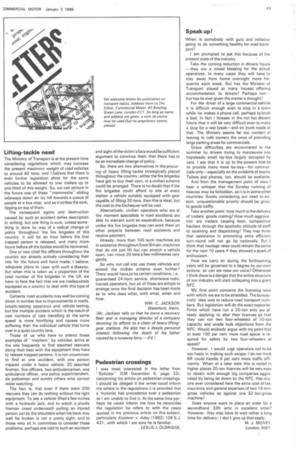Speak up!
Page 45

If you've noticed an error in this article please click here to report it so we can fix it.
When is somebody with guts and initiative going to do something healthy for road transport?
I am prompted to ask this because of the present state of the industry.
Take the coming reduction in drivers' hours --they are a mixed blessing for the actual operatives. In many cases they will have to stay away from home overnight more frequently each week. But has the Minister of Transport stayed at many houses offering accommodation to drivers? Perhaps. not but has he ever given the matter a thought?
For the driver of a large commercial vehicle it is difficult enough even to stop in a town while he makes a phone call, perhaps to book a bed. In fact I foresee in the not too distant future that it will be very difficult even to make a stop for a rest break—and on trunk roads at that. The Ministry seems far too content in leaving to cafe owners the onus of providing large parking areas for commercials.
Grave difficulties are encountered in the summer by drivers trying to manoeuvre into hopelessly small lay-bys largely occupied by cars. I say that it is up to the powers that be to provide many more lay-bys—for commercials only—especially on the outskirts of towns. Toilets and phones, too, should be available.
And from the management point of view I hear a whisper that the Sunday running of heavies may be forbidden, as it is in some other countries. Surely considering our need to export, unquestionable priority should be given to goods traffic.
Take another point: how much is the delivery of traders' goods costing? How much aggravation ere traders causing keen, competitive hauliers through the apathetic attitude of staff to receiving and dispatching? They may think that assistance in promoting extra efficient turn-round will not go far nationally. But I think that haulage rates could remain the same for the next 10 years if they showed a spark of enthusiasm.
How we carry on during the forthcoming years will be governed to a degree by our own actions, so can we raise our voice? Otherwise I think there is a danger that the entire structure of our industry will start collapsing into a giant N FC.
My final point concerns the licensing laws with which we are to be straddled. The bureaucrats' idea was to reduce road transport numbers. But legislation will do the exact opposite. Firms which have run a 20-ton artic are already applying to alter their licences so that they can run two four-wheelers of 10-ton capacity and evade bulk objections from the NEC. Would anybody argue with my point that at least 150 per cent more road space is required for safety by two four-wheelers at speed?
. However, I would urge operators not to be too hasty in making such swaps: I do not think BR could handle 5 per cent more traffic efficiently. When at a later date this is noted in higher places 20-ton licences wilF be very easy to obtain with enough big companies aggravated by being let down by the NFC. Has anyone ever considered here the extra cost of tax, insurance and general expenses of two 16-tongross vehicles as against one 32-ton-gross machine? • Does anyone want to place an order for a secondhand 33ft artie in excellent order? However. they may have to wait rather a long time for delivery: 1 don't give up that easily.
M. J. MONEY, London, NW1.




























































































